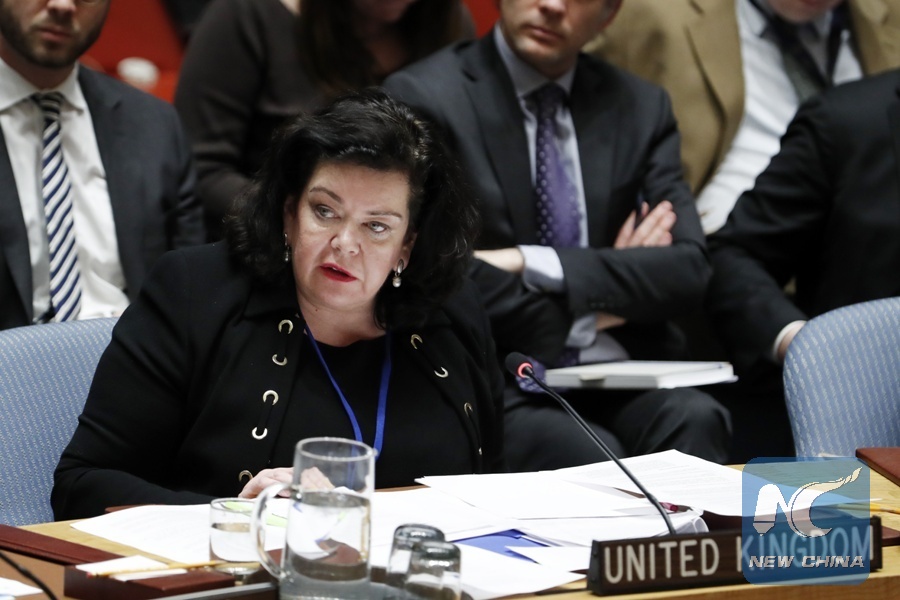
File Photo: British Ambassador to the United Nations Karen Pierce addresses a Security Council meeting on the poisoning of former Russian double agent Sergei Skripal and his daughter Yulia Skripal, at the UN headquarters in New York, April 5, 2018.(Xinhua/Li Muzi)
by Xinhua writer Wang Jiangang
UNITED NATIONS, April 18 (Xinhua) -- The United Nations (UN) Security Council Wednesday heatedly debated a new report on the alleged nerve agent attack on a former Russian spy in Britain, with some members asking to identify and apprehend the perpetrators and others urging restraint.
OPCW CONFIRMS BRITISH FINDINGS
Izumi Nakamitsu, UN high representative for Disarmament Affairs, summarized the new information about the poisoning of former Russian double agent Sergei Skripal and his daughter Yulia in the British town of Salisbury on March 4. The information was from the Organization for the Prohibition of Chemical Weapons (OPCW).
An OPCW team deployed to the site of the attack has identified toxic agents consistent with the British government's initial investigation findings, Nakamitsu said in a briefing to the Security Council.
Blood samples taken from the two victims as well as environmental samples from the site verified Britain's findings regarding the identity of the toxic chemicals, she said, adding that they were found to be of "high purity".
Skripal is a former Russian intelligence officer convicted of spying for Britain in 2006, which likely made him "a target of the Russian Federation", with evidence showing that the Skripals had been under Russian surveillance for some time, she said.
DIVERGENCE OF VIEWS
Speaking after the briefing, council members condemned the use of chemical agents in the targeted attack.
However, opinions diverged widely on the implications of the OPCW report regarding the identity of the perpetrators.
Several delegates said the "high purity" finding meant only a state-sponsored laboratory could have produced it, with some pointing to Russia as likely being involved.
Others emphasized that the OPCW had assigned no responsibility for the incident and cautioned against casting blame without concrete evidence.
Bolivia's Juan Marcelo Zambrana Torrelio said that as a multilateral instrument, the OPCW must maintain its integrity and independence.
The instrument's credibility must also be maintained in all investigations into the use of chemical weapons or agents, he said, calling for a broad, impartial and objective investigation into the Salisbury attack.
British Ambassador to the UN Karen Pierce said the report supported her government's findings that a nerve agent had been identified, with its highest concentration located on the front door of Skripal's home.
Britain described the nerve agent as "Novichok", which differed from the term used by Russia and the OPCW.
The report did not identify the country or the laboratory of origin, but said "only Russia had the means, technical experience and the motive to target the Skripals", Pierce said.
Rejecting the allegations as "completely baseless", Russian Ambassador to the UN Vassily Nebenzia said according to the OPCW report, the toxic substance could have been produced in Russia, the United States or a host of other countries.
Britain had continued to use such words as "suspected," "possible" and "may have" in all its statements about the Salisbury incident, he said, outlining various inconsistencies in its position.
Describing the findings as a "red herring", he said: "We will not step away from this."
CALL FOR RESTRAINT
Expressing concern that no perpetrators had yet been identified, Kazakhstan's Permanent Representative to the UN Kairat Umarov said chemical weapons were rapidly becoming the council's Achilles' heel.
It was also becoming increasingly difficult to discuss the issue due to escalating tensions, divisions and even hateful rhetoric, Umarov said.
Expressing regret that those weapons have not been eliminated, he urged all parties to "exercise restraint and avoid taking action" before establishing concrete proof on the ground.
Chinese Ambassador to the UN Ma Zhaoxu said the Salisbury issue should be addressed in accordance with the Chemical Weapons Convention, adding that his government was firmly opposed to the use of chemical weapons under any circumstances.
The OPCW technical secretariat had yet to reach conclusions acceptable to all. Further comprehensive and impartial investigations were needed to draw conclusions that could "withstand the test of time and history", Ma said.
As the international community faces numerous challenges, relevant parties must "reject a cold war mentality" and join hands to maintain global peace and stability, he said.
Council members must remain united to jointly fulfil their duties in maintaining international peace and stability, he added.

